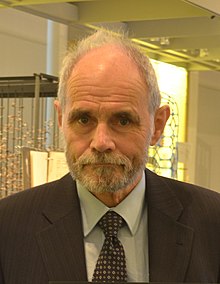Danish historian of science (born 1944)
Helge Stjernholm Kragh (born February 13, 1944) is a Danish historian of science who focuses on the development of 19th century physics, chemistry, and astronomy.[1]
His published work includes biographies of Paul Dirac, Julius Thomsen and Ludvig Lorenz, and The Oxford Handbook of the History of Modern Cosmology (2019) which he co-edited with Malcolm Longair.[1]
Biography
Kragh studied physics and chemistry at the University of Copenhagen, graduating with a degree in 1970. He earned his Ph.D. in physics in 1981 at the University of Roskilde. He received a second doctorate, in philosophy, from the University of Aarhus in 2007.[2]
Kragh was an associate professor of history of science at Cornell University from 1987 to 1989, a professor at the University of Oslo from 1995 to 1997, and a professor at Aarhus University in Denmark from 1997 to 2015.[2]
As of 2015 he retired, becoming emeritus professor at the Niels Bohr Institute at the University of Copenhagen.[2]
He is also a professor emeritus at the Centre for Science Studies of Aarhus University.[3]
Kragh's areas of study are the history of physics from the mid-19th century onward, the history of astronomy, the history of cosmology and the history of chemistry. He is known for his work on the history of the periodic system, early quantum atomic models, speculative cosmology and the northern lights.[3]
